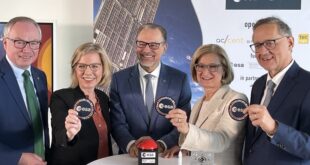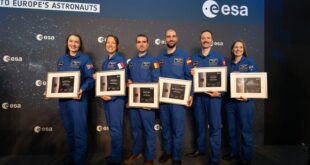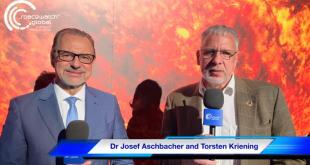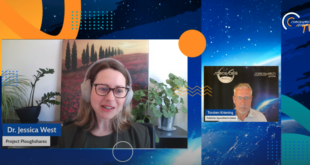By Luisa Low
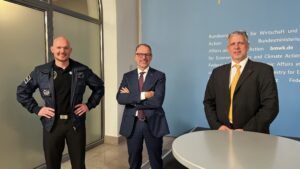
There are fewer people more qualified to talk about space and Europe’s skyward aspirations than Dr. Josef Aschbacher, Director General at the European Space Agency (ESA) and ESA Astronaut, Dr. Alexander Gerst. For the 100th edition of the Space Café web talk, SpaceWatch.Global publisher Torsten Kriening had the unique opportunity to speak with both space experts live at German Federal Ministry for Economic Affairs and Climate Action , held this week in Berlin.
In March 2021, Dr Aschbacher was appointed the space agency’s Director-General. In the past year, he has been responsible for the definition, implementation and development of Europe’s space infrastructure and activities, which include launchers, satellites performing Earth observation, navigation, telecommunication and space science, together with robotic exploration and ESA astronauts working on the International Space Station.
As an astronaut, German-born Dr Alexander Gerst has completed two missions to space with ESA, flying to the International Space Station (ISS) in 2014 for a six-month mission as a flight engineer on Expeditions 40 and 41. In 2018, he returned to the ISS on Soyuz MS-09, together with NASA astronaut Serena Auñón-Chancellor and Russian spacecraft commander Sergei Prokopyev, returning to earth just before Christmas that same year.
During this anniversary edition of the SpaceWatch.Global’s Space Café, the trio discuss the war’s space fallout, Europe’s ambitions for space’s future and the sector’s unique role in the global climate challenge, as well as what we all want to know – what’s it like to go for a spacewalk.
Hot wars and hard choices
The pacifism and collaboration that defined the space sector since the late 20th century has abruptly ended, with the war in Ukraine all but decimating the diplomacy and good faith cultivated carefully between Europe and Russia for decades. The rapid-fire war has forced hard choices onto ESA, with joint Europe-Russia collaborations like ExoMars, Galileo and multinational programs like ISS put into serious contention. While trade sanctions have largely muscled out Russia in the short-term, for multinational space programs involving Roscosmos, the solution isn’t as simple.
Yet-to-be-launched programs like ExoMars have quickly pivoted with ESA looking to replace Roscosmos. However, the ISS – conceived at the rale of the Cold War and of which Russia is a founding member – will continue to facilitate European, Russian and US collaboration.
While the war has in one month eroded thirty years of amicable East-West relations, ISS’s purpose may too large to be derailed by earthly divisions, according to Dr Gerst.
“There’s big problems to solve for us as a society on Earth: we have a climate change, we have an ongoing pandemic, there’s diseases, there’s wars, there’s unequal distribution of property in the world. Part of the solutions for these problems come from cooperation on the space station, and so the member states have decided to go forward with continuing cooperation.”
“And that’s what was a space also teaches us no nation alone can achieve these things by themselves. That’s why we come together and do it.”
While ISS commits to lasting collaboration, worldwide, nations are dressing in their chain mail. The US has upped its plans for spy satellites and footprint in cislunar space and yesterday, Australia announced its space-force.
Europe has also been preparing a framework for this scenario for some time. In October 2021, European space agencies teamed up to create a cyber resilience package – a move that prudently anticipated the chilling of East-West tensions and rising Russian interference.
“These days, security is an extremely important issue,” said Dr Aschbacher. “It is even more urgent than ever. It was always important, but now it’s really becoming so real.”
“The events of the 24th February forced me to relook into this package and reorient it to make sure that Europe is independent, autonomous and more resilient in space. Because space is so important for everyday life, they have to make sure that everyday life on earth, [which is] based on satellites and space infrastructure is guaranteed, and is now as independent from Russia as possible to secure a strong space sector.”
Space for a green future
In just under a month, almost 4 million Ukrainians have fled to neighbouring countries to escape the Russia’s onslaught, which has already killed thousands of soldiers and civilians. It is a level of crisis not seen since the Balkan Wars and Second World War, but it is not the only threat to Europe and the world’s stability. On Friday, children and youths worldwide will march for swift climate action, which if left to continue unchecked, risks destabilising the world as we know it.
It is a cause close to Dr Gerst’s heart and an issue which the space sector is working to prevent: “There’s massive problems that we as a society have and we, at ESA, we’re trying to address the biggest ones, to help out wherever we can.”
“We can help tremendously from that space perspective: we have Earth observation satellite that can see things, important climate variables, that the human eye cannot see.
“More than half of all the climate variables that are important can only be observed from space… it’s the perspective that we can add. And of course, as astronauts and humans in space, we also have a certain important perspective.
“It’s not necessarily the infrared spectrum, knowing about soil moisture, and the sea level rise. That’s what we have data and the sciences for. But we see… the other aspects, the fragility of this place – how important it is to protect us. And, you know, the realisation, if you see a thing from the outside is that, ‘wow, it’s just a little rock, and it’s surrounded by a lot of nothing’.”
Dr Gerst can talk the talk, but he can also walk the spacewalk
There are few people who get the chance to experience earth from the sky and Dr Gerst is one of them, having soared into space twice in the last decade. This week, NASA gave mission managers the go for two astronauts, Raja Chari and Matthias Maurer, to exit the ISS for a six-and-a-half hour spacewalk.
According to Dr Gerst, to prepare for a spacewalk the preparatory tasks alone – which include safety procedures, technical drills and gear checks – take at least two weeks:
“The day before your brain is constantly checking, ‘oh, did I think of this? Did I think of that?’”
But once an astronaut steps out into the infinite and into his own orbit, it’s apparently like nothing else.
“It’s an amazing thing to do, to go outside the space station, to basically be a satellite of your own. You’re following your own trajectory around Earth, and there’s nothing holding you and nothing in between you and 400 kilometres and the surface of the Earth, knowing that you have a three millimetre thick visor that protects you. It’s an amazing thing. But of course, it’s teamwork – there’s always hundreds, if not thousands of people involved in it.”
We’ll have to take his word for it.
To listen to Dr Josef Aschbacher and Dr Alexander Gerst’s insights into the Space Sustainability Ratings, you can watch the full program here:
Luisa Low is a freelance journalist and media adviser from Sydney, Australia. She currently manages Media and Public Relations for the University of Sydney’s Faculty of Engineering.


